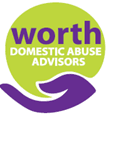Campaign urges people in Sussex to spot the signs and report domestic abuse

New six-week #YouAreNotPowerless campaign highlights that a typical victim endures up to 35 assaults before seeking help.
During the national lockdown, Crimestoppers saw a 49% increase in domestic abuse reports, and comparing the past 5 months (April to August 2020) with the same period last year, we have seen a staggering 70% increase in reports about domestic abuse. The UN has described the worldwide increase in domestic abuse as a "shadow pandemic" alongside Covid-19.
It’s estimated that a typical victim endures up to 35 assaults before speaking up, and that can be for many different reasons; fear of losing their children; fear of losing their home; fear of not being believed; even thoughts that they are somehow to blame for the abuse.
But bystanders – those in the know whether that’s because they’ve heard or witnessed abusive behaviour, or because the victim has confided in them – can speak up straight away to help stop the abuse and get the victims the support they desperately need.
if you suspect someone is a victim of domestic abuse, speak up anonymously on 0800 555 111, or fill in our quick, safe & easy online form.
With support from the Home Office, Refuge, Respect, the Employers’ Initiative on Domestic Abuse (EIDA), Hestia and Neighbourhood Watch, our 6-week #YouAreNotPowerless social media campaign is directed at those who suspect someone is either a victim or perpetrator of domestic abuse.
We want to improve the public’s understanding of what domestic abuse is and who it affects, one key point being that not all abuse is physical – it can also be emotional, psychological, sexual, financial, verbal and involve controlling or coercive behaviour.
We’re urging people to flag up concerns if a friend, neighbour, colleague or family member is suffering in silence.
We’re also working with the EIDA, an umbrella organisation of large and small companies that helps employers take action on domestic abuse, and Hestia, a domestic abuse charity which runs the Everyone’s Business Advice Line, a free and confidential resource where employers can get advice on effectively responding to disclosures of domestic abuse by their employees.
Later in the campaign, we’re taking a more preventative approach, focusing on perpetrators. Domestic abuse is a complex issue and we recognise that some people can be stopped if they acknowledge their behaviour and accept that they need help.
Whilst we normally focus on people with information about those involved in crime, this approach will be directed at those whose behaviour has `crossed the line’, encouraging them to seek help, such as through the Respect Phoneline on 0808 802 4040. With 1 in 4 perpetrators reoffending, encouraging abusers to face up to their behaviour and get help to change their ways will go some way in preventing future domestic abuse tragedies.
“Domestic abuse affects 1 in 4 women and 1 in 6 men during their lifetime. In too many cases, it results in death, with 2 women murdered by a current or former partner each week. Statistics also tell us that 1 in 5 children will witness domestic abuse. I can’t imagine being that victim, terrified to make a wrong move, say a wrong thing - and I don’t want to even try to imagine being that child, scared, defenceless and alone.
“We hear heart-breaking stories each and every day from people who are doing the right thing and telling us anonymously when they think domestic abuse is happening. We all need to realise that victims are normally too scared and traumatised to seek help. There was a time when people didn’t know what they could do if they didn’t feel confident in talking to the authorities, but thankfully, those days are over.
“Ordinary people’s information, via our charity, helps law enforcement bring a halt to the abuse and violence in the home. Our message is clear – by working together, being aware and reporting what we know, together we can help put a stop to domestic abuse; we can save lives.”
if you suspect someone is a victim of domestic abuse, speak up anonymously on 0800 555 111, or fill in our quick, safe & easy online form.
Please note: Computer IP addresses are never traced and no-one will ever know you contacted us. For telephone calls, we have no caller line display, no 1471 facility and we have never traced a call.
Domestic abuse - who can help in Sussex
 Click here to reach out easily for support from this online
Click here to reach out easily for support from this online
directory of local victim services.
 Registered charity providing help and support for people affected by domestic abuse in West Sussex. Click here.
Registered charity providing help and support for people affected by domestic abuse in West Sussex. Click here.
Helpline available Monday to Friday from 10.00am to 3.00pm: 01903 896202. Online chat available Monday to Friday 12.30pm to 2.30pm.
 Starting conversations about domestic abuse and amplifying
Starting conversations about domestic abuse and amplifying
the voices of people that are not heard, giving people the
opportunity to understand the complex intricacies of what it really means to experience abuse and how we can all create better outcomes for people who really need it. Click here.
 Support for women who are living with or are in recovery from
Support for women who are living with or are in recovery from
domestic abuse. Click here.
 WORTH Services have teams of domestic violence advisors across West
WORTH Services have teams of domestic violence advisors across West
Sussex available 5 days a week (Monday-Friday) 9.00am-5.00pm to help
you, with quick access to interpreters. Click here or call 07834 968539.
Read our blog by Sussex Police & Crime Commissioner Katy Bourne about the new update to the Safe Space Sussex website.
visit our blog pages for the latest on domestic abuse and how to combat it, from those on the front line.